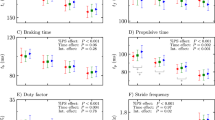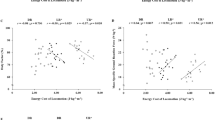Abstract
THE decision to hold the 1968 Olympic Games in Mexico City at an altitude of 7,500 ft. above sea-level has aroused interest in the effects of altitude on athletic performance. It has been known for some time that the maximum oxygen intake of acclimatized adults falls off right from sea-level upwards, reaching 50 per cent of the sea-level at 20,000 ft.1. According to these results the decline in maximum oxygen intake at 7,500 ft. would be 8 per cent and the times for running distances of 1,500 m and more should be longer by approximately this amount. Over shorter distances, an increasingly large fraction of the total energy requirement is covered anaerobically and the decrement should be progressively smaller. In sprint events, factors such as the reduced density of the air at altitude might even lead to improved performance.
This is a preview of subscription content, access via your institution
Access options
Subscribe to this journal
Receive 51 print issues and online access
$199.00 per year
only $3.90 per issue
Buy this article
- Purchase on Springer Link
- Instant access to full article PDF
Prices may be subject to local taxes which are calculated during checkout
Similar content being viewed by others
References
Pugh, L. G. C. E., Gill, M. B., Lahiri, S., Milledge, J. S., Ward, M. P., and West, J. B., J. App. Physiol., 19, 431 (1964).
United States 1956 Olympic Book, edit. by Bushnell, A. S., and Lentz, A. G. (U.S. Olympic Association, New York, 1957).
Author information
Authors and Affiliations
Rights and permissions
About this article
Cite this article
PUGH, L. Altitude and Athletic Performance. Nature 207, 1397–1398 (1965). https://doi.org/10.1038/2071397a0
Published:
Issue Date:
DOI: https://doi.org/10.1038/2071397a0
This article is cited by
-
Effects of low and high levels of moderate hypoxia on anaerobic energy release during supramaximal cycle exercise
European Journal of Applied Physiology (2006)
-
Athletic Performance at High Altitude
Nature (1966)
Comments
By submitting a comment you agree to abide by our Terms and Community Guidelines. If you find something abusive or that does not comply with our terms or guidelines please flag it as inappropriate.



